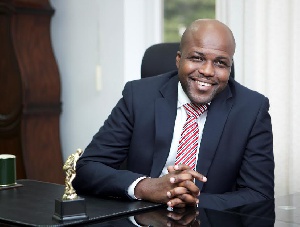The current guidelines for investing pension funds are too restrictive and do not allow for long term investment that could radically change the country’s economy, Kojo Addae-Mensah, CEO of Databank, has said.
In an exclusive interview with the B&FT, the Databank CEO said pension fund managers need more leverage to invest in a lot more assets, listed and unlisted, that would return higher yields over the long term.
The way out, he reckons, is for the National Pension Regulatory Authority (NPRA), to amend investment guidelines in order for fund managers to “take a bit more risk to get some good return for contributors.”
Mr. Addae-Mensah, whose outfit is the second largest pensions fund manager with more than GH¢300million in assets, for example, wants the restriction that only up to 5percent of funds can go into listed assets to be adjusted saying “all I am asking for is a bit more.”
The Central Bank has been releasing funds from the Temporary Pension Fund Accounts (TPFA), to fund managers and trustees, and so far, over GH¢300million has been released, with a balance of GH¢1.8billion outstanding.
“It is important that we are able to invest in some other assets. I understand the NPRA perfectly that there is the need to protect people’s monies because if we are not careful fund managers can do all sorts of things with these monies but there is the need for proper regulation and control.
All I am asking for is a bit more. Currently there is a restriction of not more than 5percentthat can go into a listed asset, which can be increased. I want to invest more than that in listed assets and I am also calling for investments in unlisted assets with certain guidelines,” he said to the B&FT.
When pension funds, mostly known as “patient capital” are invested in sectors of the economy like manufacturing and agriculture, especially agro-processing, it will not only create more jobs but will help grow the economy at large, he said.
“Companies that do agric processing have the potential to be transformers in agriculture. As a country I believe agric is something that is a huge sector for us but we do not see enough funding go in the way it should.
But the process of agro-processing is such that it takes some time. For an end-to-end tomato processing company, it will take time from the farm to a warehouse, processing, canning and then distribution. If the guy wants to expand his project, you cannot give him money for one year at 30 or 35percent,” he added.
The National Pensions Act 2008 clearly states, under permitted investments, that pension fund and assets shall be invested in bonds, bills and other securities issued by the government.
They can also invest in bonds, debenture, ordinary shares of limited companies listed on a stock exchange with good records, declared and paid dividends in the preceding five years; bank deposits and bank securities; investment certificates of closed-end investment fund or hybrid investment funds, redeemable preference shares and other debt instruments issued by corporate entities and listed on a stock exchange.
According to the limitations in Guidelines on Investment of Pension Scheme Funds, as issued by the NPRA, Pension Fund Assets still have extra limitations regarding the percentage of funds or assets under management to be invested in particular securities.
For example, a maximum of 30percent of Pension Fund assets may be invested in local government securities; up to 5percent of pension fund assets can be invested in eligible bonds, Real Estate Investment Trusts (REITs), Mortgage Backed Securities (MBS), and debentures of any corporate entity; and a maximum of 35percent of Pension Fund assets may be invested in Money Market Securities.
To Mr. Addae-Mensah, since pension funds are long term funds that do not need returns immediately, fund managers should be given a little more room to take calculated risks with specific guidelines from regulators.
“Most people contributing to pension funds are not retiring in the next 20 years and so by the time they are ready to enjoy their pension, those funds would have made significant returns, if properly managed.
There are many local companies doing well which are not listed. Why can’t we help them grow and develop? This is the only way we can grow this country. America was developed with pension money. That is how it was built, with patient money. They expanded their industries and went multinational.
We have seen several companies struggle to raise capital to expand in this country because the only capital available is short term, which is expensive and serve as day-to-day turnarounds and not for long term investments.”
Business News of Tuesday, 6 September 2016
Source: B&FT













